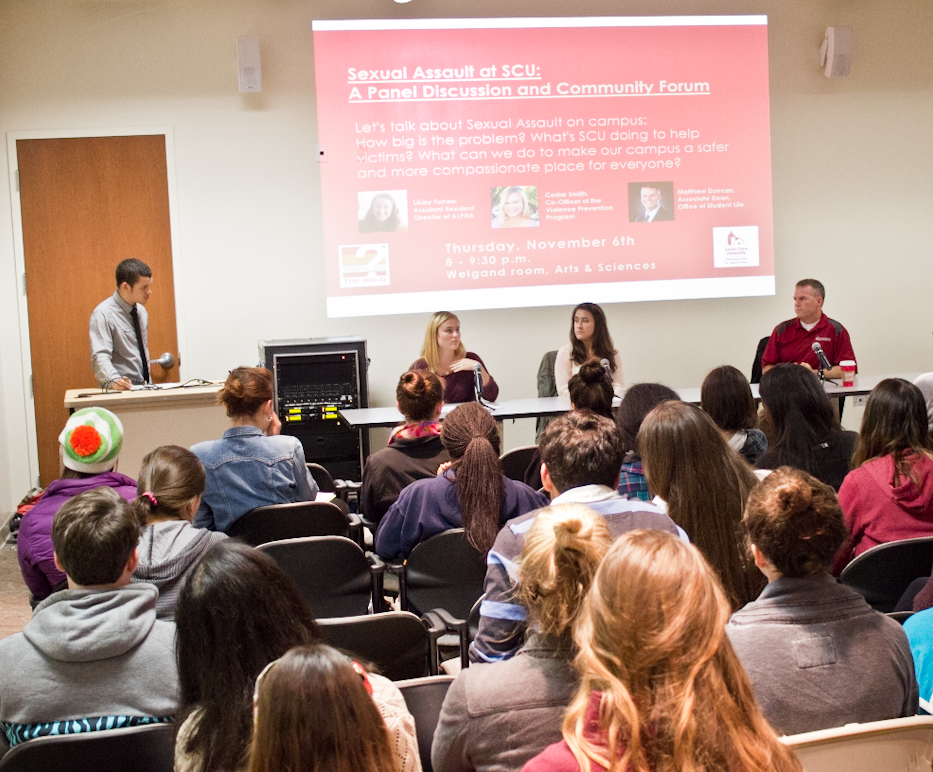Forum Talks Sexual Assault Culture on Campus
Ethics Center holds panel to discuss issues, potential solutions
Krista ClawsonTHE SANTA CLARANovemeber 13, 2014

[dropcap]A[/dropcap] 2012 anonymous survey showed that a substantial number of Santa Clara students had non-consensual sex that went unreported to university officials.
The survey conducted by Santa Clara’s Wellness Center, along with other topics related to sexual assault, were brought up in a panel discussion and community forum hosted by the Markkula Center for Applied Ethics on Nov. 6.
Conversations that night addressed sexual assault as a problem on campus, what Santa Clara is doing to assist sexual assault survivors and how the campus can be made a more safe and compassionate place.
The Wellness Center’s survey randomly selected 1,053 undergraduates. From the survey, 2 percent of males and 3.1 percent of females reported that, in the previous 12 months, someone had sex with them without their consent after drinking alcohol.
At the same rate, with an undergraduate enrollment of 5,435 students and an equal gender ratio, 54 males and 84 females can be expected to have had non-consensual sex in 2012.

These numbers are high compared to the number of reported sexual assaults on campus. In 2011, Santa Clara reported zero counts of the crime. In 2012, there was one and in 2013, there were seven, according to Tony Williams, the forum’s moderator.
“I personally would say that the numbers of zero and one are shockingly low, and I don’t think that can be truly representative,” said Libby Furrow, assistant resident director of the ALPHA Residential Learning Community.
Matthew Duncan, associate dean of the Office of Student Life, said the number of sexual assaults that the university reports to the federal government “(is) not reflective of what has actually been reported in total to the Office of Student Life.”
He said sexual assaults occurring in specific locations such as residence halls, public areas or places adjacent to the Santa Clara campus must be reported to the federal government as part of the Clery Act, which requires universities to disclose on-campus sexual assaults. Duncan said many reports to the school happen in private residences, but do not get reported to the government.
“Since 2004, there have been anywhere from 5 to 12 reported sexual assaults in a given year,” Duncan said. “Since January, we have had 12 reported sexual assaults.”
Williams asked the panel if they felt the school’s procedures for dealing with sexual assault are fair and compassionate. Cedar Smith, co-officer of the Wellness Center’s Violence Prevention Program, said the procedures should ensure a survivor’s comfort throughout the reporting process.

“I think Campus Safety has some room for growth in terms of the ways that they take the reports,” Furrow said. “I think they don’t necessarily get a lot of training in ways to approach these really difficult conversations.”
To increase dialogue about sexual assault on campus, the panel and audience suggested that students should engage in conversations about healthy relationships.
They also said Santa Clara should educate students on how to support sexual assault survivors and should make information about sexual assault prevention more accessible.
“When we have events like this, men feel intimidated and don’t want to come in,” said senior Amanda Bolan, who attended the event. “If we can get men more involved, then they will feel like they can, for example, call their friends out when they engage in behavior that supports rape culture.”
Belinda Guthrie, Title IX coordinator, said she hopes to implement a “three-click rule” to raise awareness about the sexual assault reporting process.
“Within three clicks from the home page of a university, anyone should be able to access information on how to report a sexual assault, who to report it to and which resources are available,” Guthrie said.
Contact Krista Clawson at kclawson@scu.edu or call (408) 554-4852.
Correction: The Wellness Center's survey received 1,053 responses, not 1,500. Nov. 13, 2014.